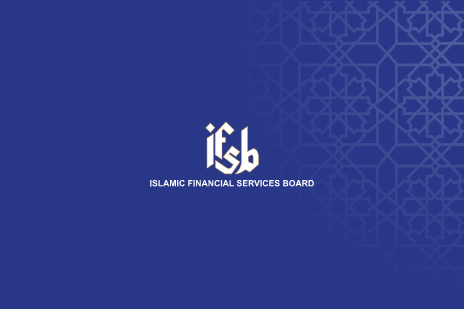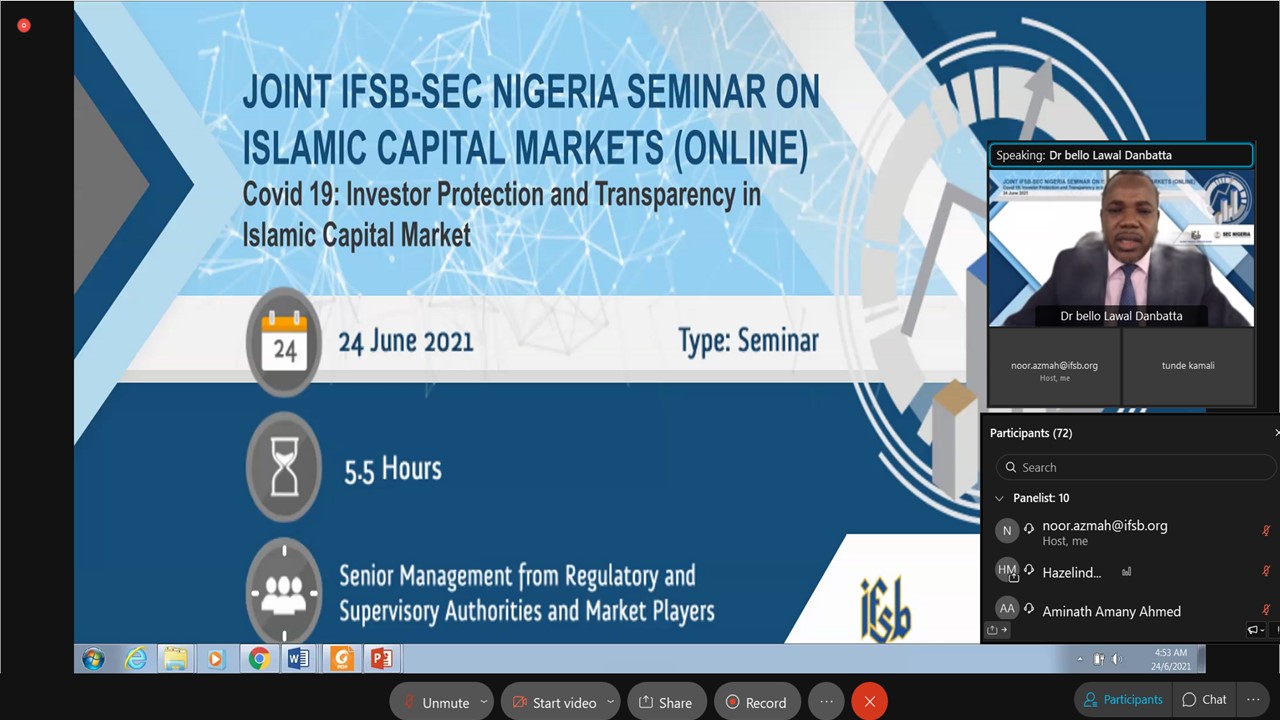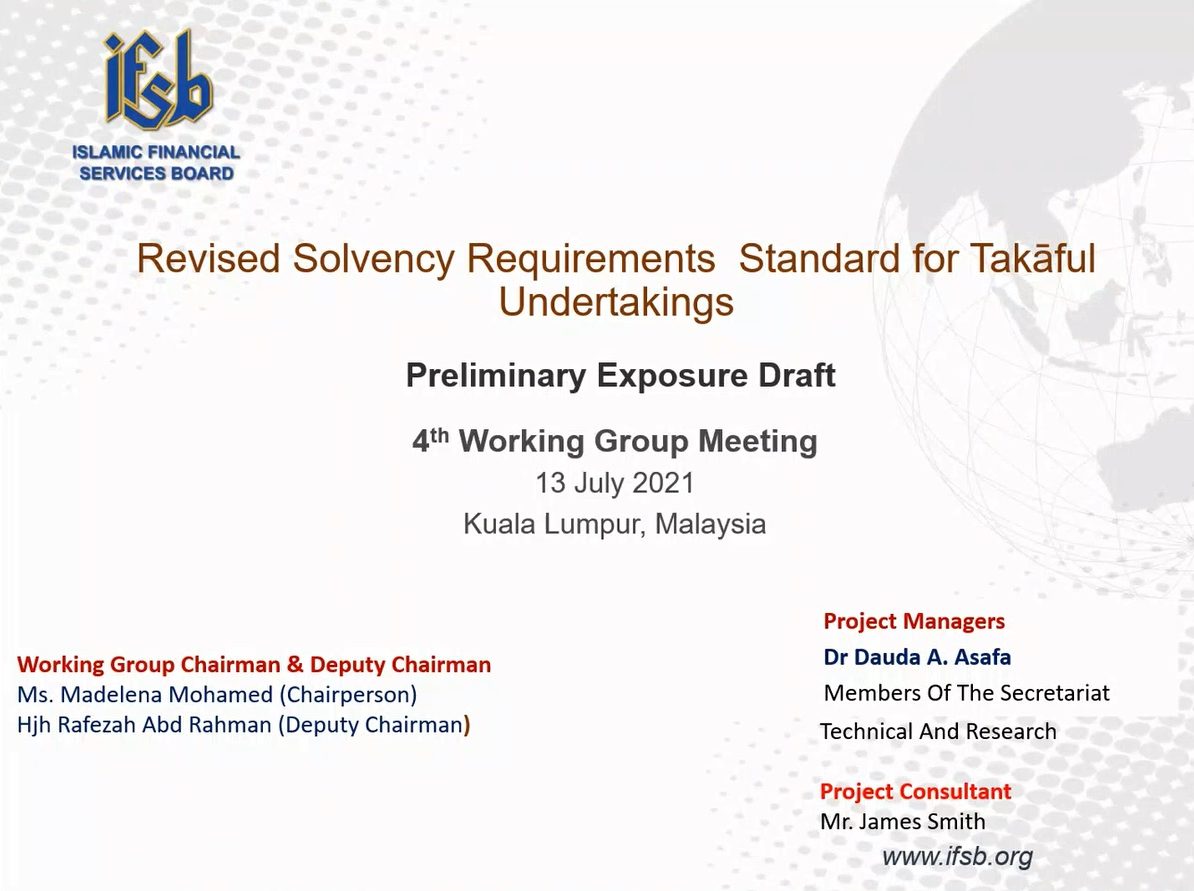COVID 19: INVESTOR PROTECTION AND TRANSPARENCY IN ISLAMIC CAPITAL MARKET The pandemic has unexceptionally affected all economic and financial sectors globally, including the Islamic financial services sector. Given the ongoing uncertainty created by the pandemic and the potential risks it poses for economic growth and financial stability, protecting investors against possible market failures, as well as enhancing transparency and information available to investors are essential in regaining investor trust and confidence in the Islamic capital markets, which is in turn, crucial to prevent any deterioration of market conditions. Many market failures directly impact investors, including asymmetry of information, agency problems or detrimental conflicts of interest. They may affect the functioning of the market and contribute to the perception that capital markets are an unsafe environment. Thus, it is imperative for policy makers and regulators to address these issues through regulatory intervention, in order to rebuild investor confidence during volatile market conditions and to effectively address possible market failures that could impact the level of protection of investors. Better protected investors are also likely to make more informed investment decisions and be less prone to react irrationally to market events or follow “herd behavior” which are disruptive for financial markets and the economy as a whole. Thus, transparency and investor protection can be seen as factors that ultimately contribute to the stability of financial markets. The seminar therefore aims to increase awareness of the importance of investor protection and transparency in fostering investor confidence and ultimately the sustainability and stability of the Islamic capital markets and to provide a platform to discuss critical policy issues arising in the context of the current global financial environment. Objectives The seminars’ main objectives are to: Address Islamic finance-specific issues in relation to investor protection. Discuss best practices for investor protection in the ICM and the elements of a robust investor protection framework. Highlight best practices and guidelines on disclosure requirements for ICM products, specifically for ṣukūk and Islamic collective investment schemes (ICIS). Identify issues arising from the current global environment, and share policy actions taken by various regulators and policy makers to address emerging challenges and issues. Programme Outcome At the end of the seminar, participants will have a comprehensive understanding on investor protection and disclosure requirements to strengthen investor confidence and improve financial market performance. The seminar will be structured around guidance from IFSB standards, as well as experiences from the industry. Participants will be able to takeaway insights on the various policy approaches and best practices in different jurisdictions to address new and emerging issues related to investor protection and transparency in light of the new global realities. Programme Approach Interactive discussions on a wide array of issues on investor protection and transparency in the ICM Discussion on the best market practices and regulatory challenges Event Snapshots Programme - Event Session(s) Date Time Topics Day 1 24/06/2021 16:30 - 16:45 Welcoming Remarks (IFSB) Dr. Bello Lawal Danbatta, Secretary-General, Islamic Financial Services Board 16:45 - 17:00 Opening Remarks (SEC Nigeria) Mr. Lamido Yugaga, Director General, SEC Nigeria 17:00 - 17:45 Session 1: Overview of the Islamic Capital Markets in Nigeria Development and growth of the Islamic capital markets in Nigeria Islamic finance development, products and issuances in Nigeria Regulatory developments and challenges COVID-19 and impact on the market Presenter: Mr. Abdulkadir Abbas, Head of Department – Securities and Investment Services, SEC Nigeria 17:45 - 17:50 Short Break 17:50 - 18:30 Session 2: Strengthening Investor Protection in the Islamic Capital Markets Overview of regulatory issues and the key principles of investor protection; Overview of the global Islamic capital markets and trends The role of product governance, conduct of business requirements (including client assets, best execution, and conflicts of interest etc.), and good practices in relation to investor redress and investor education, and; Emerging investor protection issues in the Islamic capital markets in the context of the current global environment Presenter: Ms. Aminath Amany Ahmed, Member of the Secretariat, Islamic Financial Services Board 18:30 - 19:30 Afternoon Break 19:30 - 20:15 Session 3: Enhancing Transparency in the Islamic Capital Market (Sukuk) Principles of transparency and disclosure for Sukuk and regulatory best practices Overview of key regulatory considerations and specificities of Sukuk Role of transparency and disclosure in protecting Sukuk investors Addressing emerging issues and challenges for Sukuk through better informed investors Presenter: Peter Casey, Consultant, Islamic Financial Services Board 20:15 - 20:20 Short Break 20:20 - 21:05 Session 4: Enhancing Transparency in the Islamic Capital Market (ICIS) Overview of key regulatory considerations and specificities of ICIS Principles of transparency and disclosure for ICIS and regulatory best practices Role of transparency and disclosure in protecting ICIS investors Addressing emerging issues and challenges for ICIS through better informed investors Presenter: Peter Casey, Consultant, Islamic Financial Services Board 21:05 - 21:15 Short Break 21:15 - 22:00 Session 5: Panel: Safeguarding investors in a challenging global environment Implications of the COVID-19 pandemic for the Islamic capital markets Policy actions taken by regulators to mitigate the impact of the pandemic Key investor protection issues arising from the unprecedented economic and financial market conditions and addressing these issues; Promoting investors’ confidence in an uncertain environment through greater market transparency, assessment and information. Q&A on specific considerations and policy issues unique to the Islamic capital market and the way forward. Panelists: Peter Casey, IFSB Consultant (Lead Panelist) Mr. Abdulkadir Abbas, Head of Department – Securities and Investment Services, SEC Nigeria Mrs. Hajara Adeola, Managing Director, Lotus Capital Limited Mr. Hichem Bouqniss, Execuitve Director, International Islamic Liquidity Management Corporation


